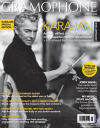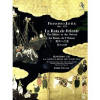Texte paru dans: / Appeared in: |
|
|
Interview with
Linday Kemp
"Music is the true living history of mankind, and we put our faith in it because what it says relates to our feelings; without it, we would be left with only lifeless fragments." Jordi Savall likes to quote Elias Canetti to explain the thinking behind his recent recording projects, which have linked music to historical events or periods in sumptuous packages combining music with text and image to create what must be the most physically desirable CD products on the market. Following on from releases which explored the worlds of Don Quixote and Christopher Columbus not just in music but also in fat, magnificently illustrated booklets, the format has been repeated for a homage to one of history's great missionary figures, Francis Xavier.
A founding father of the Jesuit order in 1540, the Spanish-born Xavier travelled round Africa to India, the Far East and Japan on an II-year journey during which, it is said, he converted more people to Christianity than St Paul (Xavier was canonised in 1622). "It's something we cannot imagine today," says Savall, "a man who travelled 100,000 kilometres alone - alone because the people who went with him were not on his intellectual level, and because when he wrote to his colleagues back home it took six months to get a reply - yet was always fulI of energy, always singing psalms, talking to people and working to convert them. I am full of admiration for him."
The music on these discs evokes the colours of Xavier's travels, as Savall augments his own ensembles - Hesperion XXI and La Capella Reial de Catalunya - with musicians from the Japanese and Indian oral traditions. If such cultural juxtapositions are in vogue in the early music world music right now, SavalJ is certain of their validity: "From the historical point of view, early music has points of contact with these other kinds of music; sometimes they even have the 5an1e language. People from the West find it fascinating to hear this strange music because it is very attractive, but to listen to a whole disc of Japanese music demands a certain level of preparation, intellectual engagement and courage. To listen to it in between music representing our own history, however, that opens windows." Xavier's position in the intellectual life of Europe also has a place in the project, and as Savall points out, he certainly lived in interesting times. "In the 50 years of Xavier's life so many important things happened, so much change. Our idea was to reflect the most essential of them." Thus there is music by composers including Encina, Narvaez, Morales, Isaac and Sermisy relating to Xavier's early years in Spain and the times he spent in Paris, Rome and Lisbon, while the booklet reprints key contemporary philosophical and religious texts from the likes of Erasmus, More, Luther and Machiavelli, as well as from documents such as the Constitution of the Society of Jesus. "I think it's interesting today to have all these things together. Not many people have read these texts - I've only just read them! and it makes an extraordinary resume and a very nice complement to the music. If you are reading Machiavelli's The Prime and hear a pavan that was played in Venice at the same time, or read about Ferdinand's conquest of Navarra and listen to a villancico which talks about it, you get a great sense of convergence, yes?"
But what about Canetti's words? Is this ultimately an emotional experience or an intellectual one? Savall has no doubts: "You can read about Granada, of course, but when you listen to a song by Encina then you really feel its history." |
|
|
|
|
|
Cliquez l'un ou l'autre
bouton pour découvrir bien d'autres critiques de CD |
|




